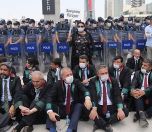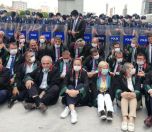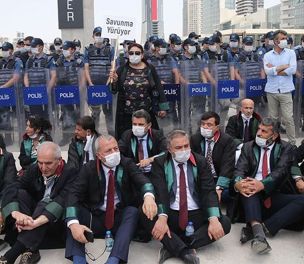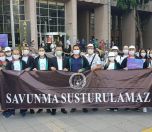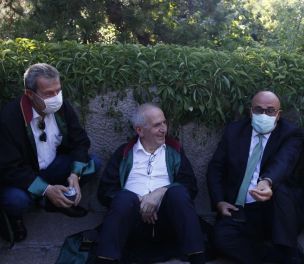* Photo: Anadolu Agency (AA) - Archive
Click to read the article in Turkish
Approved by the Parliament's Justice Committee on July 6, the bill foreseeing the establishment of more than one bar association in a city among many other changes in the structure of bars has been put on the agenda of the Grand Assembly of the Parliament.
Ahead of a Parliamentary debate on the bill jointly prepared by the ruling Justice and Development Party (AKP) and allying Nationalist Party (MHP), main opposition Republican People's Party (CHP), Peoples' Democratic Party (HDP) and İYİ Party have expressed dissenting opinions.
In its minute of dissent, the CHP has noted that the AKP's criticisms about bar associations' "engagement in politics" do not reflect the truth; on the contrary, the establishment of multiple bar associations in a province will lead to political divisions among lawyers.
CLICK - 'Turkey's bill on multiple bars will divide the legal profession along political lines'
As for the HDP, the party has indicated that the government aims to "get the judiciary into line" with this legal amendment. Underlining that the planned change in the number of delegates to represent the bars in the Union of Turkish Bar Associations (TBB) will lead to inequality, the HDP has warned that it will mean "the domination of the minority over the majority."
In their dissenting opinions, İYİ Party MPs have reminded the Parliament that bar associations are "professional organizations in the capacity of public institutions" and argued that "it is against the unitary structure of the state."
"That a party which has embraced the slogan of 'A single nation, single flag, single homeland, single state' defends a system of 'Multiple Bars' is contradictory," İYİ Party MPs have underlined further.
'AKP represented 67 percent with 34 percent'
In the minute of dissent submitted by the main opposition CHP, the MPs have referred to the justification for the bill in reference to a low representation of bar administrations. The MPs have responded in reference to the 2002 elections, when the AKP came to power.
Citing the current administration of the Ankara Bar Association, which came into office by taking 70 percent of votes, as an example, the MPs have noted that while the ruling AKP received 34.28 percent of votes in the 2002 general elections, it represented 67.1 percent at the Parliament when the number of its the then MPs is taken into account.
"While the AKP should have got 188 MPs with 34 percent of votes, it got 363 MPs instead. So, 175 MPs were chalked up for the AKP without the party having deserved it," the CHP MPs have contended.
'Justice in representation to be undermined'
The dissenting opinion of the CHP has also referred to the planned changes in the number of delegates to be sent by individual bar associations to the Union of Turkish Bar Associations (TBB).
Underlining that this change will undermine the principle of justice in representation, the CHP has noted that the bill aims to weaken Ankara, İstanbul and İzmir bars, "which are not dependent on the government."
Reference to "supporters of Fethullah Gülen"
In its minute of dissent, the CHP has also referred to the supporters of Fethullah Gülen, the head of the FETÖ, which is held responsible for the failed coup attempt on July 15, 2016. The party has said that this bill is the "incomplete project" of Gülen supporters.
Indicating that "the government will surely use the expression of 'We were deceived' about this bill in upcoming years, as it did before" the main opposition party has further noted that this legislation "will cause so irrecoverable damages in the legal system, the principle of rule of law and democracy that this expression will not suffice to make amends."
Lastly, the party has reiterated that according to the duties and authorities of bar associations specified in the Constitution, they are "professional organizations in capacity of public institutions." Accordingly, the CHP has argued that the bill is against the Article 35 of the Constitution.
HDP: Domination of the minority over majority
As for the HDP's dissenting opinion, it has indicated that the government aims to "get the judiciary into line" with this legal amendment.
Underlining that the planned change in the number of delegates to represent the bars in the Union of Turkish Bar Associations (TBB) will lead to inequality, the HDP has stated that "while the three largest bar associations of Turkey have 60 percent of all lawyers in Turkey as their members, they will be represented by less than 10 percent" if this bill becomes a law.
Noting that there is "no public good" in the bill, the party has also indicated that the bill is against the Articles 2, 9, 10, 11, 67 and 135 of the Constitution as well as the Article 6 of the European Convention on Human Rights."
About the bill
Foreseeing the establishment of more than one bar association in a city, the Bill on Amendments to the Attorneys' Act and Some Laws was submitted to the Parliamentary Speaker's Office on June 30.
According to the bill jointly prepared by the ruling Justice and Development Party (AKP) and Nationalist Movement Party (MHP) MPs, lawyers can register in any bar association if there are more than one bar association in the city. The bill foresees that a bar association will be established by a minimum of 2,000 lawyers if there are over 5,000 lawyers in a city.
According to the figures of the Union of Turkish Bar Associations (TBB), while 17,598 lawyers are registered in Ankara Bar Association, 46,052 lawyers are registered in İstanbul Bar and 9,612 lawyers in İzmir. The total number of registered lawyers across the country is 127,691.
That being the case, the bill "to split bar associations" is likely to affect these three bars with over 5,000 lawyers.
Cutting the number of delegates from large bars representing thousands of lawyers to the Union of Turkish Bar Associations (TBB), the bill is also criticized for reducing the influence of large bar associations in electing the TTB's president and participating in other decision-making functions.
As pointed out by the Human Rights Watch (HRW) in a statement on July 8, "A provincial bar with fewer than 100 lawyers, such as Ardahan in northeastern Turkey, for example, would be represented by 4 delegates, compared with 3 at present. But a bar such as Izmir in western Turkey, with over 9,500 lawyers, which sends 35 delegates, would be entitled to only 5."
Accordingly, the İstanbul, Ankara, and Izmir Bar, Associations which represent 55 percent of the lawyers in Turkey, will be entitled to only 7 percent of all delegates within the national union.
The bill was approved by the Parliamentary Justice Commission on July 6. It will now be debated at the General Assembly. (TP/SD)





-132.jpg)
